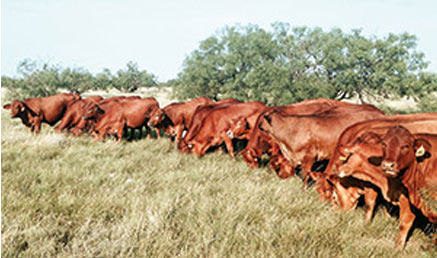By Lorenzo Lasater, President Sustainability is a word that gets thrown around a lot these days. It is defined as “the quality of not being harmful to the environment or depleting natural resources, and hereby supporting long-term ecological balance.” This definition seems like an awfully good description of what cow-calf producers do every day. Sadly though, there are those who accuse our industry of being unsustainable. This claim has less to do with reality than the hidden agenda of groups who wish to end production agriculture. But perception can become reality in the minds of an uninformed public, so ranchers have a duty to stand up for themselves and share the wonderful story of grass-based ranching.

In the larger Beef Chain, grain obviously plays an important role. The majority of beef consumed in this country is grain-fed in the final stages of production. But a typical beef animal is two years old or less at harvest and often spends as much as three-quarters of its life on pasture or in fields. One of the real ironies of grain use in agriculture is that it began due to the overproduction of grain caused by the Farm Program, paying farmers to grow crops America didn’t need for human consumption. Faced with tremendous oversupply, ranchers began feeding it to livestock rather than burning it.

We use simple antibiotics occasionally to doctor a sick animal, much like giving children antibiotics when they have strep throat. Being able to treat sick animals successfully, and prevent illness from spreading, is a critical part of ensuring their welfare. Isa Beefmasters never feeds antibiotics or mass treats animals. This practice is simply not necessary in a pasture environment—and would be cost-prohibitive anyway. In addition, we never use growth implants (hormones) in our operation. Because we carry our seedstock through to breeding production, any short-term advantage in weight gain is negated over the course of time. My own personal opinion is that the Beef Industry should voluntarily and collectively stop using growth implants. This is not because they are bad for consumers—in fact science has repeatedly proven that they are not. But the buying public doesn’t like the idea, and no amount of science is going to change that opinion. The Beef Industry has more important battles to fight. If we give up their use collectively, no one loses the advantage. No discussion about sustainability would be complete without a word about ethanol. This biofuel was foisted on the American public under the guise of sustainability. It sounds good right? Burn “renewable resources” instead of fossil fuels. But like many ideas born of good intentions, the program came with a whole host of unintended consequences. To begin with, some studies estimate that it costs one gallon of diesel to produce one gallon of ethanol—so it’s just a feel-good pass-through with no real benefit. Ethanol also completely upended the market prices for livestock grains, which in the end, raises the price for the Beef you love. The high price of corn caused by ethanol also raises land rents, and its higher production massively increases the use of chemical fertilizers and water from aquifers needed for irrigation. In a real twist of irony, ethanol also greatly reduces biodiversity, as huge amounts of croplands are converted to corn production. The point here is that sustainability is not always what some folks would have us believe. As a fifth-generation rancher (working to raise the sixth), I take offense when people point fingers at the ranching industry. As I’ve outlined above, Beef cattle in America are raised in a very sustainable way. Those who claim otherwise either haven’t taken the time to learn about what we do or have a different agenda, such as ending production agriculture or promoting a vegetarian lifestyle. The point they overlook, though, is that people have to eat. Cattle are “farming the corners”—taking energy from the sun in the form of plants and converting it to nutrient-dense, protein-rich and super-tasty Beef. And this is being carried out on millions of acres of land not useful for other types of agriculture, especially farming. That is pretty darn sustainable, and I am proud to be a part of it.
© ISA BEEFMASTERS 1996-2023 ALL RIGHTS RESERVED.